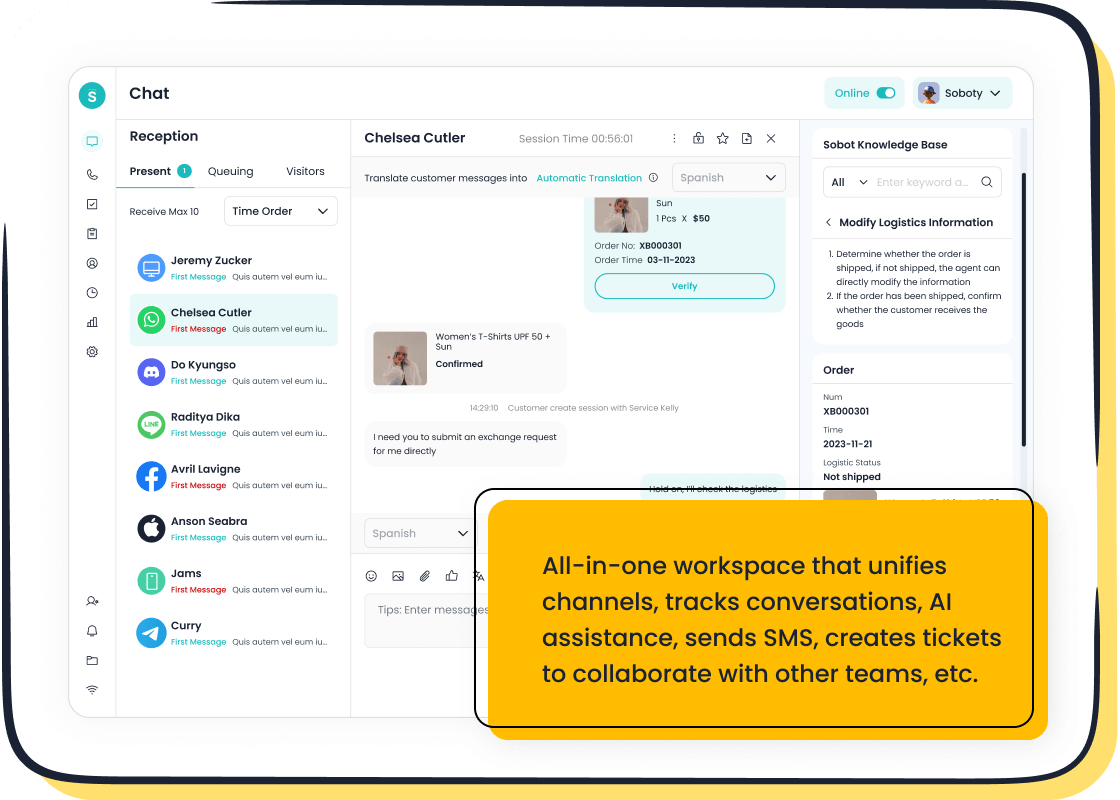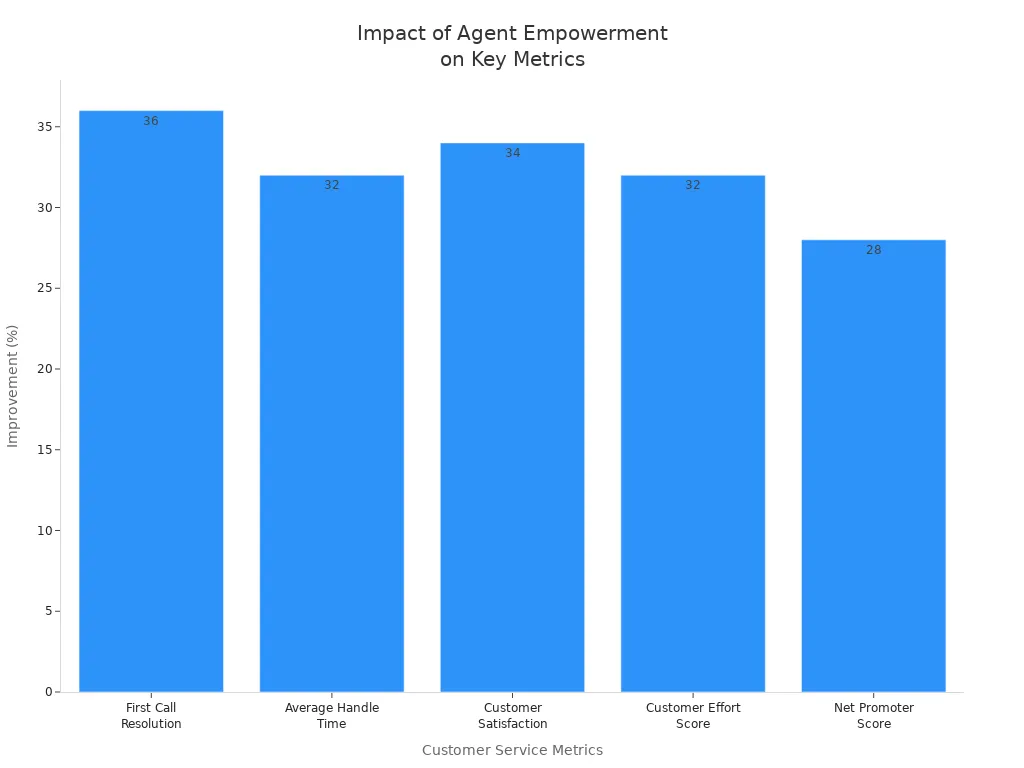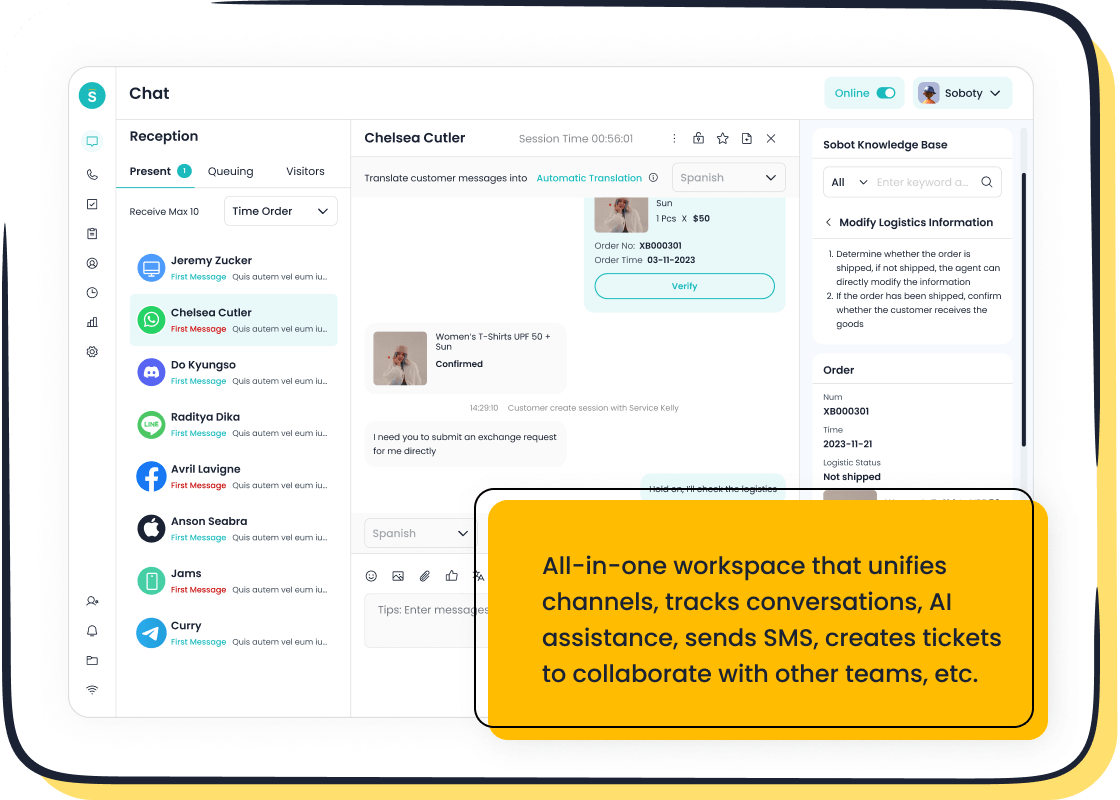Maintaining Human Touch in Customer Service in 2025

Yes, businesses can maintain the human touch in customer service in 2025 by blending technology, empathy, and personalization. Imagine a customer waiting for help, frustrated by robotic replies that miss the emotional cues. Recent data shows 52% of customers still prefer human agents for empathy, even as 95% of interactions use AI. Companies like Sobot lead innovation with Sobot AI and Sobot call center solutions, ensuring every customer service experience feels personal and genuine.
| Metric | Automated (AI-powered) Customer Service | Human Customer Service Preference |
|---|---|---|
| Percentage of interactions handled by AI | 95% | N/A |
| Customer preference for human support | N/A | 52% |
| Customer satisfaction score (out of 10) | 9/10 | N/A |
Customer Service Challenges in 2025
Customer service challenges in 2025 have grown more complex as technology and customer expectations evolve. Companies must address a range of customer service issues to deliver a strong customer experience. Sobot, with its broad client base across industries like retail, finance, and manufacturing, has seen these challenges firsthand.
Rising Expectations
Customers now expect fast, seamless, and personalized service. They want answers right away, whether they use a website, app, or social media. Many customers demand 24/7 support and mobile-friendly platforms. Meeting high expectations means companies must offer consistent, accurate, and friendly service at every touchpoint. Customers also want self-service options, but still value access to human agents for complex problems. These rising expectations make customer service challenges more demanding than ever.
Customers expect quick responses, real-time help, and personalized experiences. Companies that fail to meet these standards risk losing business.
Technology Integration
Technology brings both solutions and new challenges. By 2025, 95% of customer interactions are expected to be AI-powered, with 80% of companies using generative AI to improve service (source). Automation helps manage large volumes of inquiries and provides instant answers. However, integrating new systems can create customer service issues, such as inconsistent experiences or data silos. Sobot’s omnichannel solutions help unify communication, making it easier for agents to deliver consistent service across all channels.
| Metric Description | Percentage |
|---|---|
| Customer interactions expected to be AI-powered by 2025 | 95% |
| Customer service organizations implementing generative AI by 2025 | 80% |
Data Privacy
Data privacy stands out as one of the most pressing customer service challenges. Customers worry about how companies use their personal information. Studies show that 75% of consumers have concerns about AI risks, and 63% fear data breaches or misuse. Many people do not trust companies to handle data ethically. Sobot addresses these customer service issues by following strict data protection policies and offering secure, compliant solutions. This builds trust and helps companies meet privacy regulations.
Companies must balance innovation with transparency and strong data protection to maintain customer trust.
Balancing Automation and Human Touch

Role of AI and Automation
Businesses in 2025 rely on AI and automation to handle routine customer inquiries. AI-powered chatbots and virtual assistants answer common questions, reset passwords, and provide order updates. These technologies use machine learning and natural language processing to understand customer requests and respond quickly. Automation improves operational efficiency by reducing errors and speeding up problem resolution. For example, chatbots can manage thousands of requests at once, offering 24/7 support and reducing wait times.
Sobot’s Live Chat and omnichannel solutions help companies automate repetitive tasks while maintaining a high-quality customer service experience. The platform uses AI to route inquiries, summarize tickets, and suggest responses, allowing human agents to focus on complex issues. Businesses report up to 70% productivity improvement and a 50% reduction in service costs after implementing Sobot’s solutions. OPPO achieved an 83% chatbot resolution rate, while Samsung reached a 97% customer satisfaction rate using Sobot Live Chat.
AI excels at handling simple, high-volume tasks, freeing human agents to address more meaningful work. However, automation alone cannot replace the human touch in customer service, especially when customers need empathy or face complex problems.
Customers value automation for its speed and consistency. Research shows that 70% of consumers prefer a hybrid model, combining automation for routine matters and human interaction for complex scenarios (McKinsey). Automation also enables real-time engagement, which 64% of consumers expect. By balancing automation and human touch, companies can increase customer retention by 25% and boost revenue by up to 10%.
When Empathy Matters Most
Empathy plays a critical role in customer service experience, especially during emotionally charged or complicated interactions. AI agents often struggle to understand emotional context and nuance, which can lead to customer frustration. Human agents excel at recognizing emotions, providing reassurance, and resolving sensitive issues. For example, when customers feel angry, confused, or distressed, they seek empathy and personalized support.
Human agents are best suited for:
- Handling complex problem-solving that requires deep understanding of customer needs.
- Providing emotional intelligence to de-escalate tense situations.
- Resolving multi-step cases, such as cancellations or sensitive billing issues.
- Offering personal advice for high-value purchases, like luxury goods or insurance.
Studies reveal that 75% of customers prioritize empathy and authenticity in their service experiences. Nearly 65% want an escalation path to human agents when dissatisfied with AI responses. Emotional intelligence in interactions can increase customer loyalty by 25%. Customers often feel disconnected during AI-only interactions, risking brand loyalty. Personalized, empathetic support encourages customers to return and recommend the brand.
Human touch in customer service builds trust and confidence, especially when automated personalization reaches its limits.

Sobot Live Chat Solutions
Sobot’s Live Chat and omnichannel solutions provide a seamless blend of automation and human touch in customer service. The platform supports multiple channels, including websites, apps, WhatsApp, Facebook, Instagram, Telegram, and Discord. This ensures customers can reach businesses on their preferred platforms, leading to no missed or lost calls.
Sobot Live Chat uses AI-assisted tools to automate routine inquiries, enabling agents to focus on complex and emotional cases. The unified workspace consolidates customer data, allowing agents to deliver personalized service. Built-in analytics evaluate over 150 indicators, helping businesses optimize their customer service experience and make informed decisions.
| Company/Business | Outcome/Metric | Value/Improvement |
|---|---|---|
| OPPO | Chatbot resolution rate | 83% |
| OPPO | Repurchase rate boost | 57% |
| Samsung | Customer satisfaction rate | 97% |
| Agilent Technologies | Service efficiency increase | 6x (sixfold) |
| Agilent Technologies | Cost reduction | 25% |
| Agilent Technologies | Customer satisfaction score | 95% |
| General businesses | Productivity improvement | Up to 70% |
| General businesses | Service cost reduction | Up to 50% |
| Opay | Customer satisfaction improvement | From 60% to 90% |
| Opay | Cost reduction | 20% |
Sobot’s solutions also improve reception efficiency by 48%, reduce average handle time by 41%, and increase first-contact resolution rates by 54%. These measurable outcomes demonstrate how Sobot helps businesses achieve higher customer satisfaction and operational efficiency.
Michael Kors, a leading luxury fashion brand, adopted Sobot’s all-in-one platform to unify customer reception channels and integrate internal systems. The brand saw an 83% reduction in response time, a 95% customer satisfaction rate, and a 20% increase in conversion rates. Sobot’s WhatsApp API enabled Michael Kors to enhance marketing outreach and improve customer engagement. This case highlights the impact of balancing automation and personalization with genuine human interaction.
Sobot’s omnichannel solutions empower agents to deliver empathy and personalized support, while AI handles routine tasks. This approach extends the customer lifecycle and fosters loyalty.
Businesses can follow effective strategies to integrate automation without sacrificing human interaction:
- Identify repetitive tasks suitable for automation to free human resources for strategic activities.
- Segment customer interactions, automating simple inquiries and reserving complex discussions for human agents.
- Use data insights from automation to personalize engagement and improve effectiveness.
- Maintain flexibility for seamless switching between automated and human interactions.
- Train teams in communication and emotional intelligence to maximize the benefits of automation.
By adopting these strategies, companies can achieve a balanced approach that enhances customer satisfaction and loyalty. Sobot’s solutions support this model, ensuring every customer service experience feels personal and efficient.
Personalization in Customer Service
Data-Driven Insights
Modern customer service relies on data to create meaningful connections. Companies collect information about customer preferences, behaviors, and purchase history across multiple touchpoints. This data helps businesses understand what customers want and how they interact with brands. Sobot Live Chat uses AI-driven analytics to extract actionable insights from every conversation. By analyzing customer journeys, Sobot enables agents to deliver personalized responses that address individual needs. Businesses can use gamified lead collection and interactive experiences to gather zero-party data, improving the accuracy of future recommendations. AI and machine learning further optimize the customer experience by predicting needs and suggesting relevant solutions.
- Companies that use data-driven personalization see higher engagement and loyalty.
- Real-time segmentation and unified data platforms allow for consistent messaging across all channels.
- Privacy-friendly techniques, such as contextual data, help companies adapt to changing regulations.
Tailored Experiences
Personalization shapes every step of the customer journey. Sobot Live Chat empowers agents to offer tailored experiences by unifying customer data from websites, apps, and social media. Customers feel valued when agents remember their preferences and past interactions. Studies show that 80% of customers prefer brands that offer personalized experiences, which can boost retention by up to 56%. When companies provide proactive help and understand customer history, satisfaction scores rise. Personalized experiences also reduce complaints and foster loyalty, making customers more likely to return.
- 82% of consumers say personalized experiences influence their purchasing decisions.
- 61% are willing to spend more with companies that customize their service.
- Effective personalization requires real-time data and collaboration across teams.
Unified Customer View
A unified customer view brings together all interactions and data into one platform. Sobot’s omnichannel solution integrates communication channels, ensuring agents have instant access to comprehensive customer history. This approach eliminates the frustration of repeating information and allows for seamless transitions between channels. Customers expect consistent service, and 79% want personalized interactions enabled by unified data. Businesses with strong omnichannel strategies retain 89% of customers, compared to only 33% for those without. A unified view not only improves customer satisfaction but also increases agent productivity and reduces operational costs.
Companies that maintain a unified customer view deliver consistent, high-quality service and build lasting trust with their customers.
Empathy and Human Touch in Customer Service
Emotional Intelligence Training
Empathy stands at the core of a human-centered service model. Companies invest in emotional intelligence training to help agents recognize and respond to customer emotions. Training programs focus on self-awareness, self-management, social awareness, and relationship management. These elements teach agents to stay calm, understand customer feelings, and build positive relationships. Role-playing and simulations allow agents to practice dealing with emotional customers and de-escalate tense situations. Continuous learning through workshops and mentorship helps agents improve their customer service quality. Sobot supports this approach by providing agents with real-time feedback and quality assurance tools, which help them apply emotional intelligence in every customer service experience.
| Element of Emotional Intelligence | Description | Application in Customer Service Training |
|---|---|---|
| Self-Awareness | Recognizing own emotions and triggers | Predict and manage reactions during customer interactions |
| Self-Management | Managing impulses and adapting behavior | Stay focused on service despite challenges |
| Social Awareness | Recognizing emotions in others | Empathize and understand customer feelings |
| Relationship Management | Influencing and managing relationships | Build trust and turn difficult conversations positive |
Empowering Agents
Empowering agents leads to consistent customer service quality and faster resolutions. When agents have access to unified customer data and autonomy, they resolve issues more effectively. Sobot’s omnichannel workspace gives agents a single source of truth, reducing time spent searching for information. Engaged agents are 3.3 times more likely to solve problems and meet KPIs such as Average Handle Time and First Call Resolution. Companies see a 36% increase in first call resolution and a 34% rise in customer satisfaction when agents feel empowered. Sobot’s platform provides tools and analytics that support agent confidence and improve customer service quality.

Building Customer Trust
Trust forms the foundation of relationship-based service and customer loyalty. Customers want transparency, security, and consistent customer service quality. Research shows that 82% of U.S. customers desire more human touch in customer service, and only 38% feel truly understood by service workers. Sobot builds trust by combining secure digital tools with empathetic human agents. The platform uses strong security measures, clear communication, and proactive support to protect customer data and maintain trust. Flexible service rules and personalized experiences help agents meet customer needs and foster loyalty. Sobot’s customer-first culture ensures every interaction supports trust and satisfaction.
Companies that prioritize empathy, agent empowerment, and trust deliver consistent customer service quality and build lasting customer loyalty.
Omnichannel Strategies for Seamless Experiences
Unified Communication
Unified communication stands at the heart of effective customer service strategies. Sobot’s omnichannel solution brings together customer interactions from websites, apps, and social media into a single workspace. Agents access complete customer histories, which helps them deliver personalized service and resolve issues faster. Customers receive consistent support across channels, increasing satisfaction and loyalty. Unified access to customer data reduces resolution times and sales cycles by up to 14%, making support more efficient and lowering costs per contact. Meeting the demand for omnichannel support also improves employee productivity, as agents use real-time information and automated tools to handle requests. Michael Kors, a global fashion brand, used Sobot’s platform to unify communication channels, resulting in an 83% reduction in response time and a 95% customer satisfaction rate.
Consistent Brand Voice
Maintaining a consistent brand voice across all customer interactions builds trust and loyalty. Sobot’s solutions help businesses keep messaging and tone uniform, whether customers reach out via chat, email, or social media. Research shows that 90% of highly satisfied customers are likely to return and recommend the brand, doubling the likelihood compared to those who are merely satisfied. Consistency fulfills brand promises and reduces confusion, making customers feel comfortable and confident. Companies with consistent branding experience up to 20% greater growth and 33% higher revenue. Iconic brands like Apple and Nike demonstrate how a unified brand identity strengthens emotional bonds and customer loyalty.
Feedback and Improvement
Collecting and acting on customer feedback drives continuous improvement in service quality. Sobot’s omnichannel solution gathers feedback from surveys, social media, and direct interactions, providing a comprehensive view of customer sentiment. Businesses use sentiment analysis and data mining to turn feedback into actionable insights. Responding quickly and communicating improvements builds trust and increases satisfaction by 30%. Companies that prioritize feedback-driven changes see higher Net Promoter Scores and customer retention. Michael Kors leveraged feedback collected through Sobot’s platform to refine its customer service strategies and enhance the overall customer experience.
Overcoming Customer Service Challenges with Sobot

Reducing Agent Burnout
Sobot addresses agent burnout by combining smart technology and supportive practices. Early recognition of burnout signs, such as emotional exhaustion or reduced productivity, allows managers to intervene quickly. Sobot’s AI tools, including AI knowledge bases and agent copilots, help agents handle high volumes of inquiries without feeling overwhelmed. Flexible scheduling and intelligent routing ensure agents receive manageable workloads. Remote and hybrid work options, endorsed by 75% of HR professionals, give agents more control over their environment. Sobot also provides ongoing training in stress management and emotional intelligence, building resilience and improving customer satisfaction. These strategies foster a healthier workplace and strengthen trust between agents and customers.
Enhancing Efficiency
Sobot’s solutions transform customer service operations by automating routine tasks and streamlining workflows. The AI Agent uses large language models to understand context and intent, delivering human-like interactions across chat, voice, email, and social media. This omnichannel approach ensures customers receive consistent support, no matter the channel. The Voicebot resolves issues using advanced technologies like ASR and NLP, reducing the need for human intervention. AI Copilot assists agents by composing responses and summarizing conversations, freeing them to focus on complex cases. Sobot’s AI Insight provides data-driven analytics, helping managers optimize team performance and improve customer satisfaction. Businesses report higher resolution rates and lower operational costs, which boosts loyalty and trust.
Real-World Success Story
Michael Kors, a global luxury fashion brand, faced challenges with fragmented communication and slow response times. After implementing Sobot’s all-in-one platform, the company unified customer reception channels and integrated internal systems. Agents gained access to complete customer histories, enabling personalized service. Sobot’s WhatsApp API enhanced marketing outreach and engagement. The results were impressive:
| Metric | Before Sobot | After Sobot | Improvement |
|---|---|---|---|
| Response Time | High | Low | 83% faster |
| Customer Satisfaction | Moderate | 95% | Significant |
| Conversion Rate | Average | 20% higher | Notable |
Michael Kors achieved a 95% customer satisfaction rate and a 20% increase in conversion rates. The unified approach strengthened trust and loyalty, showing how Sobot’s solutions help businesses overcome challenges and deliver outstanding customer experiences.
Maintaining the human touch in customer service in 2025 remains essential for building trust and loyalty. Companies that blend AI automation with empathy and personalization see higher satisfaction, as 82% of U.S. consumers want more human interaction. Sobot’s Live Chat and omnichannel solutions empower businesses to deliver seamless, personalized support across every channel. By prioritizing both people and technology, organizations gain a competitive edge.
Explore how Sobot can future-proof your customer service strategy with innovation and genuine human connection.
FAQ
What is the human touch in customer service?
The human touch in customer service means showing empathy, understanding, and personal attention. Agents listen to customer needs and respond with care. Sobot’s Live Chat helps agents connect with customers on their preferred channels, making every interaction feel personal and genuine.
How does Sobot balance automation and human interaction?
Sobot uses AI to handle routine tasks and lets agents focus on complex issues. The omnichannel solution combines chatbots and live agents. This approach improves efficiency by up to 70% and keeps customer service personal. Learn more at Sobot Live Chat.
Why is personalization important in customer service?
Personalization helps customers feel valued. Sobot’s Live Chat uses customer profiles and analytics to tailor responses. Companies see a 38% increase in conversion rates when they personalize service. Personalized customer service builds loyalty and trust.
How does Sobot protect customer data?
Sobot follows strict data protection policies and uses secure technology. The platform supports compliance with privacy regulations. Customers trust Sobot because it keeps their information safe during every customer service interaction.
Can Sobot’s solutions reduce agent burnout?
Sobot’s AI tools automate repetitive tasks and support agents with smart scheduling. This reduces stress and improves job satisfaction. Companies using Sobot report lower burnout rates and higher customer service quality.
See Also
How AI Agents Are Transforming Customer Support Services
Ways AI Software Enhances Efficiency In Customer Service
Top Ten Strategies To Improve Live Chat Satisfaction
